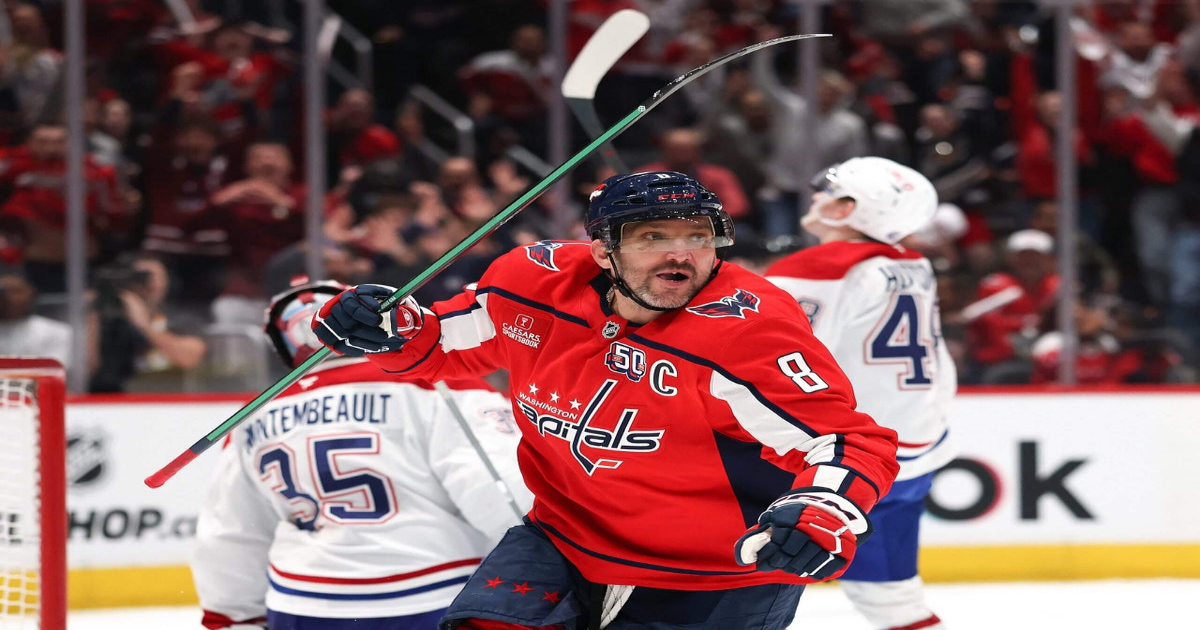WASHINGTON — Start the show with a song everyone likes. Musicians understand it, and Alex Ovechkin does, too.
For the first 20 minutes on Monday night, the Washington Capitals superstar played the hits. Not literally, but for a hockey player, as close as you can come.
“He was leading the charge,” Capitals coach Spencer Carbery said, “and dragging us into the fight.”
By the end of the night, Ovechkin — after two decades of hockey and all that entails, with more goals to his name than anyone in the history of the sport — had managed to break new ground for himself. He ended a playoff game that had gone to overtime, and in the process, helped to bail his team out of a series opener it had quite nearly frittered away.
For anyone who watched that first period, the fact the Capitals needed extra time to put away the Montreal Canadiens 3-2 should’ve been something of a surprise. The Canadiens have a knack for comebacks, we know, but these are the Stanley Cup playoffs. It’s different, or it’s supposed to be, and the Capitals know that because they’ve lived it. Players like John Carlson, Tom Wilson, Lars Eller — they’ve got hardware and experience the Canadiens can’t yet match, and they spent the game’s first chunk exerting their will and staking themselves to a 2-0 lead that felt larger by an order of magnitude.
Ovechkin, like Carbery said, led the way. He had four hits in the first period alone and seven by the end of the second, tying his regular-season high in 40 minutes. Physicality is still a big part of his game, but this was vintage 2011-era, freight-train stuff — the sort of seek-and-destroy bone-rattlers that made people say, then and now, that he’s capital-D Different.
The bigger deal, though, was that first goal. Ovechkin dropped the hammer from the top of the circle on a cross-ice, power-play pass from Tom Wilson. The similarities between that shot and the one that broke Wayne Gretzky’s career goal record earlier this month were almost eerie.
“Pretty similar, eh? That’s what we said when we got back to the bench,” Dylan Strome said. He was, both times, the guy who got the puck to Wilson.
“Obviously, it looked pretty familiar,” Wilson said. “I had so much time with the puck. I looked up and he got into that ice, that same ice that’s pretty dangerous if I can get the puck to him. When I see him get some space, you just want to put it on his tape.”

Ovechkin set up Washington’s second goal, too, when Anthony Beauvillier redirected his shot toward Sam Montembeault then scored on the rebound.
After that came the lull. At the time of Beauvillier’s goal, at 12:09 of the second period, the Capitals had out-attempted the Canadiens by 10. Montreal spent the next period and a half finding its level, chipping away, pushing back and, eventually, scoring goals.
“I thought we started overcomplicating a little bit,” Carbery said, “We got away from it. And you’ve got to give them credit, right? They push. They’re down. We know what’s coming.”
Carbery singled out Nick Suzuki’s game-tying goal with 4:15 remaining as one that felt particularly inevitable. Montreal turned Washington’s mistakes into sustained zone time, and boom.
“You can see it coming,” Carbery said. “You can see it, because there’s a couple mismanagement of plays that end up leading to bad things.”
If Suzuki’s goal was inevitable, what Ovechkin managed in overtime was, too. For months, he’s met every moment. That’s what it took to chase down Gretzky A) with time to spare, B) after starting the season 42 goals away from the record, C) when he broke his leg in November. To check all those items off took something special — a streak of sustained greatness that, for all that’s been said and written about it over the last month, might require more time and distance to fully grasp.
That’ll come eventually. For now, it’s in the rear-view mirror — because there’s still, somehow, history to make. Ovechkin managed that at 2:26 in overtime, when he scored the first playoff OT goal of his career off a net-front feed from Beauvillier, who’d pounced on his own rebound.
The first goal was pure power. The second was pure grease, and the capper to a night’s worth of multifaceted greatness from one of the best to ever do it. Forty-five times, Ovechkin has played in a postseason game that’s gone to extra time. Until Monday night, he’d never ended one himself.
“He’s a beast. He’s a machine. When he’s out there creating energy for our team, scoring, he does it all. He does everything. That’s what a leader does,” Wilson said.
“It’s one thing to be good all season long, but the guys that show up and hit and block shots and lead the team — that’s why he’s a legend.”
(Top photo: Patrick Smith / Getty Images)
